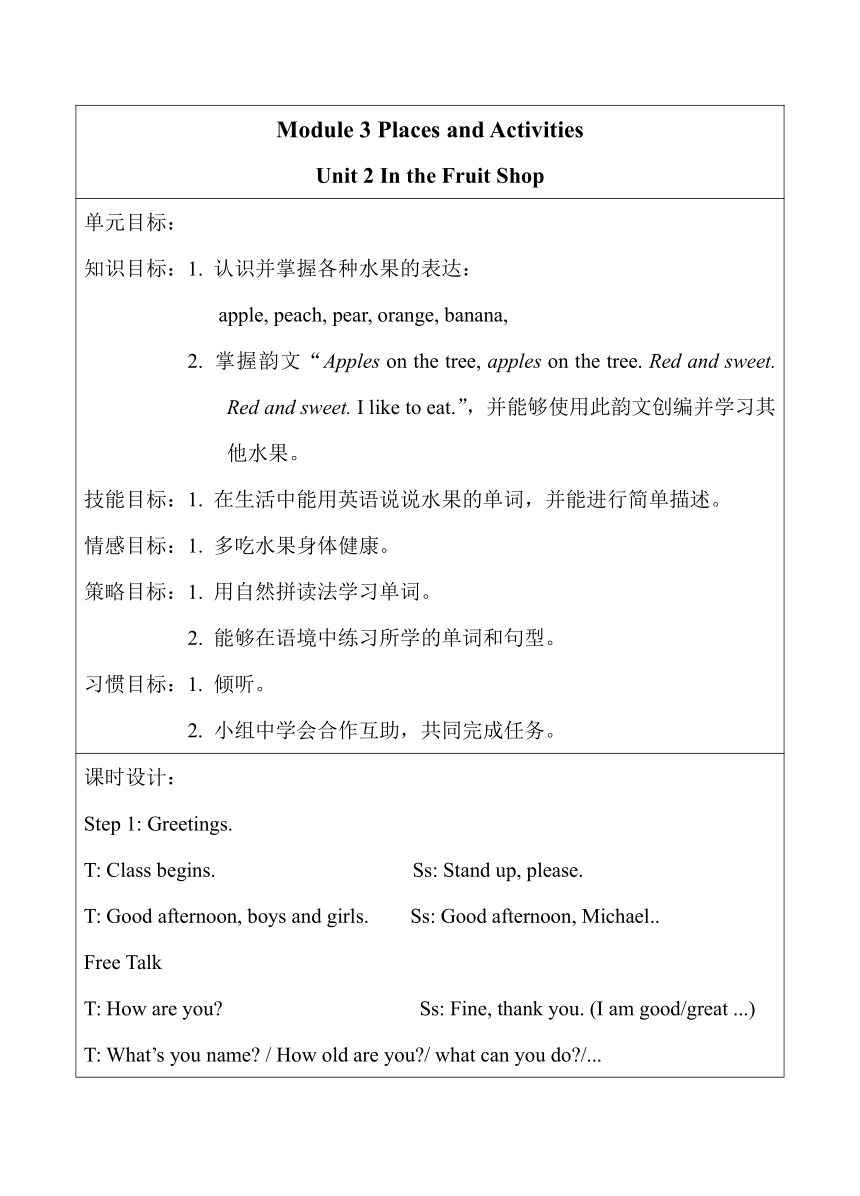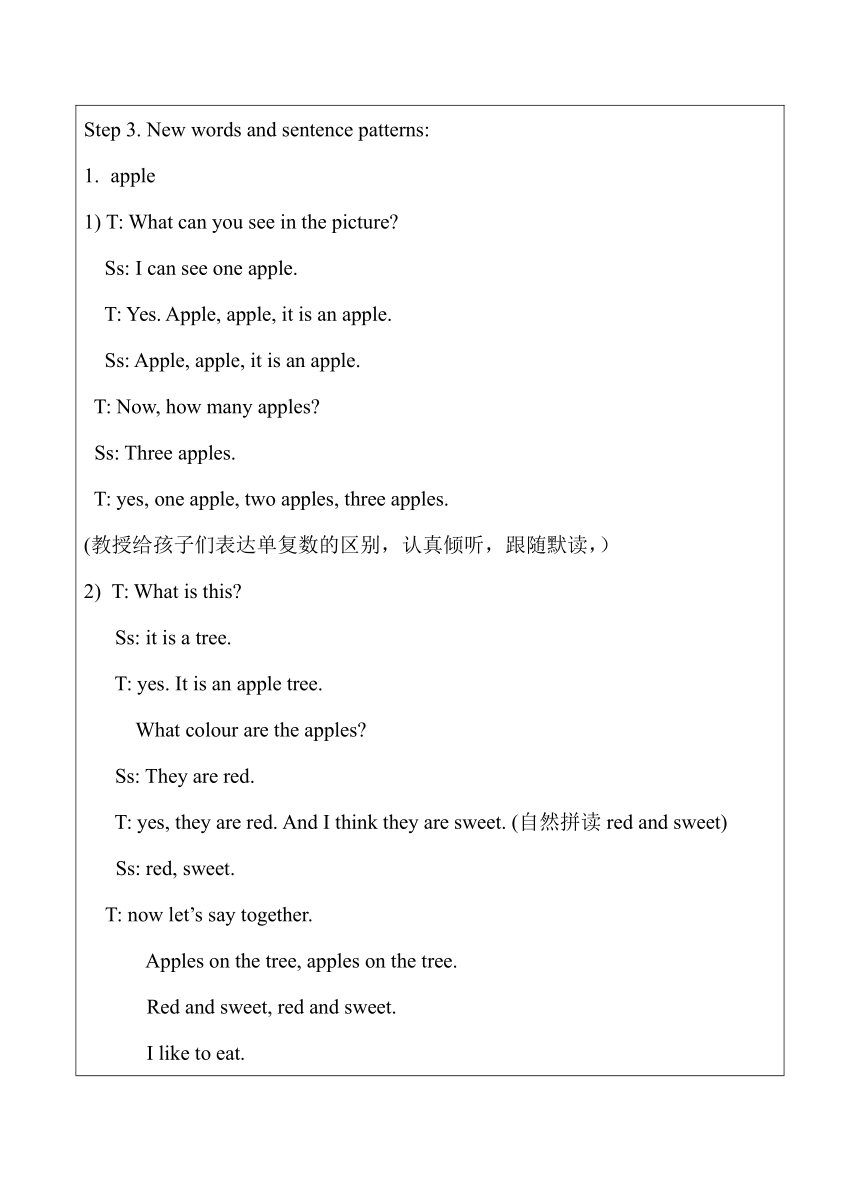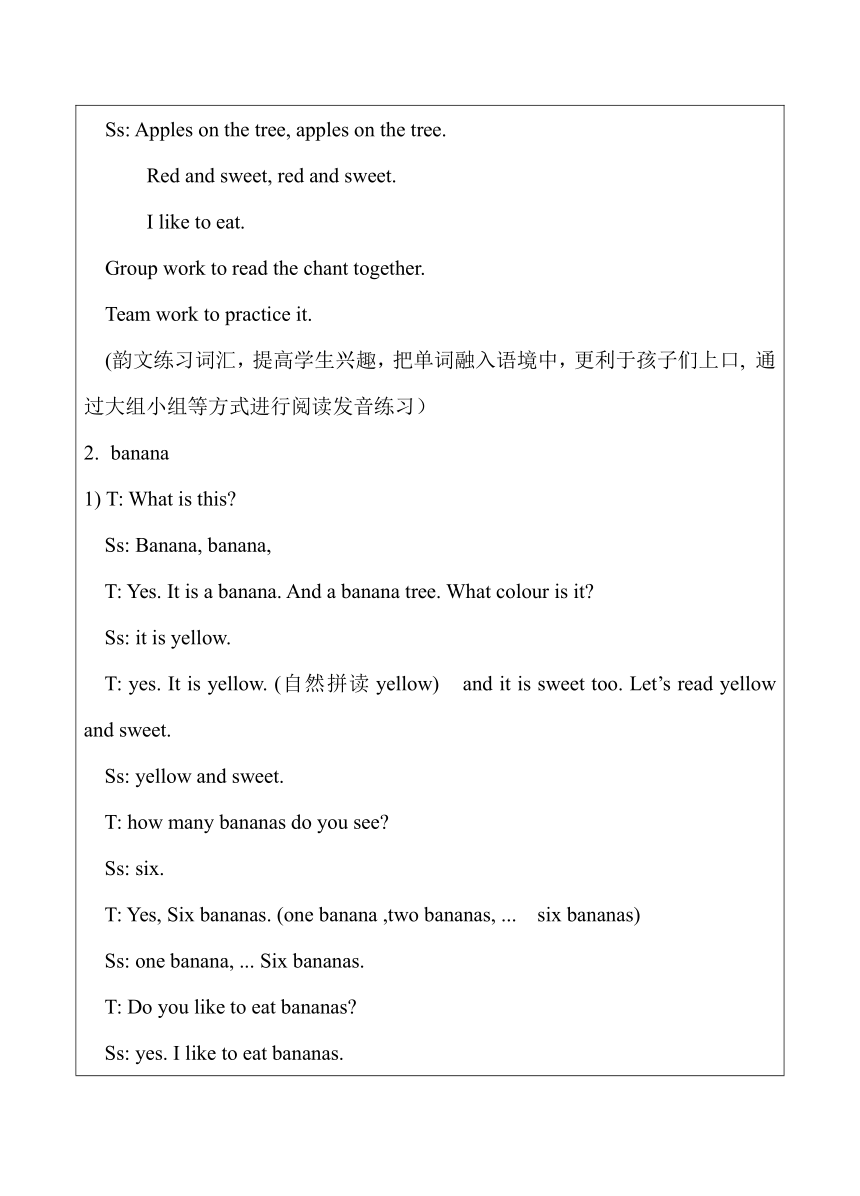Module 3 Places and activities Unit 2 In the fruit shop 教案
文档属性
| 名称 | Module 3 Places and activities Unit 2 In the fruit shop 教案 |

|
|
| 格式 | doc | ||
| 文件大小 | 43.6KB | ||
| 资源类型 | 教案 | ||
| 版本资源 | 牛津上海版(试用本) | ||
| 科目 | 英语 | ||
| 更新时间 | 2021-10-23 00:38:43 | ||
图片预览




文档简介
Module 3 Places and ActivitiesUnit 2 In the Fruit Shop
单元目标:知识目标:1. 认识并掌握各种水果的表达:apple, peach, pear, orange, banana, 2. 掌握韵文“Apples on the tree, apples on the tree. Red and sweet. Red and sweet. I like to eat.”,并能够使用此韵文创编并学习其他水果。技能目标:1. 在生活中能用英语说说水果的单词,并能进行简单描述。情感目标:1. 多吃水果身体健康。策略目标:1. 用自然拼读法学习单词。 2. 能够在语境中练习所学的单词和句型。习惯目标:1. 倾听。 2. 小组中学会合作互助,共同完成任务。
课时设计:Step 1: Greetings.T: Class begins. Ss: Stand up, please.T: Good afternoon, boys and girls. Ss: Good afternoon, Michael..Free Talk
T: How are you Ss: Fine, thank you. (I am good/great ...)T: What’s you name / How old are you / what can you do /...Ss: My name is ... ./ I am ... years old./ I can read. /...T: Sit down, please. Ss: Thank you, Michael. (通过日常问候,培养孩子认真倾听的能力,并能进行简单的对话练习)Step 2: Warming-up1. Sing a song: I like to eat, eat, eat, apples and bananas.(通过唱学过的歌曲,练习元音发音,渗透自然拼读法,不仅达到了对孩子复习检测的目的,还激起了孩子学习的兴趣。)2. Questions and answer:T: What can you hear in the song Ss: Apples and bananas.Ss; I like to eat. Ss: eatT: yes, so we can say:I can eat apples and bananas. But do you like to eat apples Ss: Yes. (No)(通过问题,锻炼孩子认真倾听,调动孩子已有的知识,了解学生认知情况,以便因材施教。)T: Why Ss: …T: Because apples are yummy. They are sweet. They are healthy. We all like to eat apples. Now let’s see some apples here. Step 3. New words and sentence patterns:apple1) T: What can you see in the picture Ss: I can see one apple. T: Yes. Apple, apple, it is an apple. Ss: Apple, apple, it is an apple. T: Now, how many apples Ss: Three apples. T: yes, one apple, two apples, three apples. (教授给孩子们表达单复数的区别,认真倾听,跟随默读,)T: What is this Ss: it is a tree. T: yes. It is an apple tree. What colour are the apples Ss: They are red. T: yes, they are red. And I think they are sweet. (自然拼读red and sweet) Ss: red, sweet. T: now let’s say together. Apples on the tree, apples on the tree. Red and sweet, red and sweet. I like to eat. Ss: Apples on the tree, apples on the tree. Red and sweet, red and sweet. I like to eat. Group work to read the chant together. Team work to practice it. (韵文练习词汇,提高学生兴趣,把单词融入语境中,更利于孩子们上口, 通过大组小组等方式进行阅读发音练习)banana1) T: What is this Ss: Banana, banana, T: Yes. It is a banana. And a banana tree. What colour is it Ss: it is yellow. T: yes. It is yellow. (自然拼读yellow) and it is sweet too. Let’s read yellow and sweet. Ss: yellow and sweet. T: how many bananas do you see Ss: six. T: Yes, Six bananas. (one banana ,two bananas, ... six bananas)Ss: one banana, ... Six bananas. T: Do you like to eat bananas Ss: yes. I like to eat bananas. T: And also the bananas are on the tree. So can you say Bananas on the tree, bananas on the tree. Yellow and sweet, yellow and sweet. I like to eat. 2) Group work. Practice the chant. Bananas on the tree, bananas on the tree. Yellow and sweet, yellow and sweet. I like to eat. 3)And individual reading to be a little teacher.S1/ S2/ S3/ …..(大组进行发音练习,选拔小老师带读。明确告诉学生当小老师的标准:发音正确,语调优美,声音洪亮,坐姿端正,举手规范。以此训练孩子的课堂常规。同时只有在小老师教的时候,认真倾听,学会知识,才有可能争当下一位小老师。所以可以通过找小老师来激发孩子的积极性,培养孩子自主学习能力。)pear1) T: What colour is it Ss: Green.(自然拼读)T: Can you guess what it is Ss: it is a pear. T: Yes, it is a pear. Follow me, pear, pear. Ss: Pear, pear. (自然拼读)T: How many pears Ss: four.T: So one pear, four pears. (pear - pears)Ss: pears. T: Are pears sweet Yes or no Ss: pears are sweet. T: Who can tell the chant Ss: Pears on the tree, pears on the tree. Green and sweet, Green and sweet. I like to eat. 2) T: Great. Who wants to be a little teacher S1/S2/S3...(通过填空模式来读小韵文,加强孩子们对句子的认读和理解,加强pear的发音练习。)peachT: What is this Ss: it is a peach. (自然拼读) T: How many peaches ( writes “p-ea-ch-es”, ss read “peaches”)Ss: two, two peaches. T:What colour are they Ss: They are pink. (自然拼读)T: Can you try the chant Ss: Peaches on the tree, peaches on the tree. Pink and sweet. Pink and sweet. I like to eat. 2) T: Who wants to be a little teacher S1/S2...orange1) T: What is it Ss: Orange.T: How many Ss: five oranges. (自然拼读)T: What colour are they Ss:orange T: Yes, they are orange. T: Remember orange is orange. Is it sweet Ss: yes / no. 2) T: some are sweet and some are sour. (自然拼读) let's use sweet to say it. Oranges on the tree, orange on the tree. Orange and sweet, orange and sweet. I like to eat. T: do you like to eat sour oranges Ss: no. T: I don’t like either. So let’s say sour oranges. T&Ss: Oranges on the tree, oranges on the tree. Orange and sour, orange and sour. I don’t like to eat. Group work. T: Maybe someone likes sour oranges. How about you (发音练习,味道喜好。)
Step 4. Practice the words and chant.Now let’s see all the fruit together. 1) words flash. 2) try the chant with the dice. 3) to be a little teacher for the chant. 通过闪词游戏复习巩固单词,加强韧度训练。通过韵文的复习,加强语段语感培养。通过小老师的选拔,增强学生兴趣和成就感。Step 5. 拓展阅读T: We all know fruit are good. And there is a saying “An apple a day keeps the doctor away.” so we’d better eat more fruit. Here is a monkey. He likes to eat fruits very much. Let’s see his story. Greedy monkey. ...T: how many fruit do you see in the story Ss: apple, banana, pear, .... T: and watermelon, strawberry. (自然拼读,合成词)Fruits are good. But not so much at one time. That’s why the monkey broke the basket. Now let’s help him to pick all the fruit. Read together. (the words)
Homework:1. Listen and read M3U2. 2. Tell the chant to your friends.
单元目标:知识目标:1. 认识并掌握各种水果的表达:apple, peach, pear, orange, banana, 2. 掌握韵文“Apples on the tree, apples on the tree. Red and sweet. Red and sweet. I like to eat.”,并能够使用此韵文创编并学习其他水果。技能目标:1. 在生活中能用英语说说水果的单词,并能进行简单描述。情感目标:1. 多吃水果身体健康。策略目标:1. 用自然拼读法学习单词。 2. 能够在语境中练习所学的单词和句型。习惯目标:1. 倾听。 2. 小组中学会合作互助,共同完成任务。
课时设计:Step 1: Greetings.T: Class begins. Ss: Stand up, please.T: Good afternoon, boys and girls. Ss: Good afternoon, Michael..Free Talk
T: How are you Ss: Fine, thank you. (I am good/great ...)T: What’s you name / How old are you / what can you do /...Ss: My name is ... ./ I am ... years old./ I can read. /...T: Sit down, please. Ss: Thank you, Michael. (通过日常问候,培养孩子认真倾听的能力,并能进行简单的对话练习)Step 2: Warming-up1. Sing a song: I like to eat, eat, eat, apples and bananas.(通过唱学过的歌曲,练习元音发音,渗透自然拼读法,不仅达到了对孩子复习检测的目的,还激起了孩子学习的兴趣。)2. Questions and answer:T: What can you hear in the song Ss: Apples and bananas.Ss; I like to eat. Ss: eatT: yes, so we can say:I can eat apples and bananas. But do you like to eat apples Ss: Yes. (No)(通过问题,锻炼孩子认真倾听,调动孩子已有的知识,了解学生认知情况,以便因材施教。)T: Why Ss: …T: Because apples are yummy. They are sweet. They are healthy. We all like to eat apples. Now let’s see some apples here. Step 3. New words and sentence patterns:apple1) T: What can you see in the picture Ss: I can see one apple. T: Yes. Apple, apple, it is an apple. Ss: Apple, apple, it is an apple. T: Now, how many apples Ss: Three apples. T: yes, one apple, two apples, three apples. (教授给孩子们表达单复数的区别,认真倾听,跟随默读,)T: What is this Ss: it is a tree. T: yes. It is an apple tree. What colour are the apples Ss: They are red. T: yes, they are red. And I think they are sweet. (自然拼读red and sweet) Ss: red, sweet. T: now let’s say together. Apples on the tree, apples on the tree. Red and sweet, red and sweet. I like to eat. Ss: Apples on the tree, apples on the tree. Red and sweet, red and sweet. I like to eat. Group work to read the chant together. Team work to practice it. (韵文练习词汇,提高学生兴趣,把单词融入语境中,更利于孩子们上口, 通过大组小组等方式进行阅读发音练习)banana1) T: What is this Ss: Banana, banana, T: Yes. It is a banana. And a banana tree. What colour is it Ss: it is yellow. T: yes. It is yellow. (自然拼读yellow) and it is sweet too. Let’s read yellow and sweet. Ss: yellow and sweet. T: how many bananas do you see Ss: six. T: Yes, Six bananas. (one banana ,two bananas, ... six bananas)Ss: one banana, ... Six bananas. T: Do you like to eat bananas Ss: yes. I like to eat bananas. T: And also the bananas are on the tree. So can you say Bananas on the tree, bananas on the tree. Yellow and sweet, yellow and sweet. I like to eat. 2) Group work. Practice the chant. Bananas on the tree, bananas on the tree. Yellow and sweet, yellow and sweet. I like to eat. 3)And individual reading to be a little teacher.S1/ S2/ S3/ …..(大组进行发音练习,选拔小老师带读。明确告诉学生当小老师的标准:发音正确,语调优美,声音洪亮,坐姿端正,举手规范。以此训练孩子的课堂常规。同时只有在小老师教的时候,认真倾听,学会知识,才有可能争当下一位小老师。所以可以通过找小老师来激发孩子的积极性,培养孩子自主学习能力。)pear1) T: What colour is it Ss: Green.(自然拼读)T: Can you guess what it is Ss: it is a pear. T: Yes, it is a pear. Follow me, pear, pear. Ss: Pear, pear. (自然拼读)T: How many pears Ss: four.T: So one pear, four pears. (pear - pears)Ss: pears. T: Are pears sweet Yes or no Ss: pears are sweet. T: Who can tell the chant Ss: Pears on the tree, pears on the tree. Green and sweet, Green and sweet. I like to eat. 2) T: Great. Who wants to be a little teacher S1/S2/S3...(通过填空模式来读小韵文,加强孩子们对句子的认读和理解,加强pear的发音练习。)peachT: What is this Ss: it is a peach. (自然拼读) T: How many peaches ( writes “p-ea-ch-es”, ss read “peaches”)Ss: two, two peaches. T:What colour are they Ss: They are pink. (自然拼读)T: Can you try the chant Ss: Peaches on the tree, peaches on the tree. Pink and sweet. Pink and sweet. I like to eat. 2) T: Who wants to be a little teacher S1/S2...orange1) T: What is it Ss: Orange.T: How many Ss: five oranges. (自然拼读)T: What colour are they Ss:orange T: Yes, they are orange. T: Remember orange is orange. Is it sweet Ss: yes / no. 2) T: some are sweet and some are sour. (自然拼读) let's use sweet to say it. Oranges on the tree, orange on the tree. Orange and sweet, orange and sweet. I like to eat. T: do you like to eat sour oranges Ss: no. T: I don’t like either. So let’s say sour oranges. T&Ss: Oranges on the tree, oranges on the tree. Orange and sour, orange and sour. I don’t like to eat. Group work. T: Maybe someone likes sour oranges. How about you (发音练习,味道喜好。)
Step 4. Practice the words and chant.Now let’s see all the fruit together. 1) words flash. 2) try the chant with the dice. 3) to be a little teacher for the chant. 通过闪词游戏复习巩固单词,加强韧度训练。通过韵文的复习,加强语段语感培养。通过小老师的选拔,增强学生兴趣和成就感。Step 5. 拓展阅读T: We all know fruit are good. And there is a saying “An apple a day keeps the doctor away.” so we’d better eat more fruit. Here is a monkey. He likes to eat fruits very much. Let’s see his story. Greedy monkey. ...T: how many fruit do you see in the story Ss: apple, banana, pear, .... T: and watermelon, strawberry. (自然拼读,合成词)Fruits are good. But not so much at one time. That’s why the monkey broke the basket. Now let’s help him to pick all the fruit. Read together. (the words)
Homework:1. Listen and read M3U2. 2. Tell the chant to your friends.
同课章节目录
- Module 1 Getting to know you
- Unit 1 Greettings
- Unit 2 My classmates
- Unit 3 My face
- Module 2 Me, my family and friends
- Unit 1 My abilities
- Unit 2 My family
- Unit 3 My friends
- Module 3 Places and activities
- Unit 1 In the classroom
- Unit 2 In the fruit shop
- Unit 3 In the restaurant
- Module 4 The natural world
- Unit 1 On the farm
- Unit 2 In the zoo
- Unit 3 In the park
